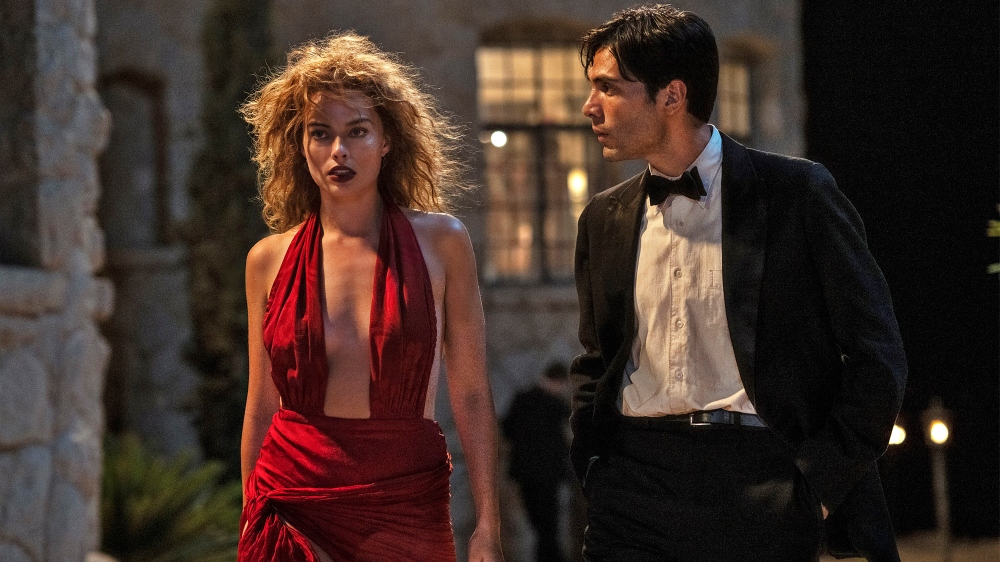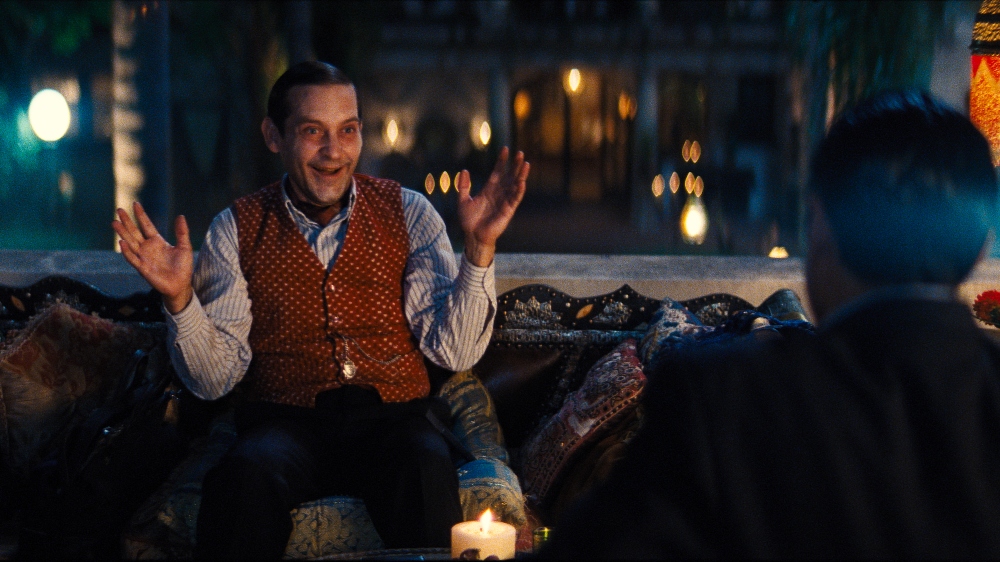At 37 years old, writer-director Damien Chazelle is quite young to be a Hollywood veteran — he’s still the youngest person to have ever won the Oscar for Best Director — but like a grizzled filmmaker twice his age, he sure does have a lot to say about showbiz and its difficult relationship with the City of Los Angeles. Chazelle named La La Land after the city itself and examined the ways in which one can fall in love with it, within it, and with the movie magic that it embodies. That stunningly original and tender film now has a follow-up of sorts — the ambitious, rambunctious, decadent Babylon. But while Chazelle’s new movie is a technical marvel in ways that demonstrate how he has grown as a filmmaker since La La Land, the movie is ultimately undone by entirely unsympathetic characters and their unintentional transformation of a touching message of hope and nostalgia into one of grotesque self-indulgence.
Loosely speaking, Babylon follows a group of aspiring filmmakers as Hollywood transitions from silent movies to “talkies” featuring sound. They principally consist of Margot Robbie as the wild, incredibly talented actress Nellie LaRoy, who claims her last name means something like “king” in French (it does not); Brad Pitt as the established, debonair actor Jack Conrad; and newcomer Diego Calva as Manny Torres, a star-struck Mexican assistant to a movie producer who harbors dreams of his own. Other equally-impressive thespians come in and out of their circles, including an under-used Jean Smart as Emily St. John, a salacious Hollywood reporter/critic; Jovan Adepo as Sidney Palmer, a jazz singer whose playful tune becomes a leitmotif for the movie; and Li Jun Li as Lady Fay Zhu, a Chicago-style mean girl performer with lots to say. Tobey Maguire also jumps into the fray late in the game as an eccentric, perverse Hollywood gangster.
Thankfully, the one thing that Chazelle’s script is not about is the flaming out of Nellie and Jack as movies become “talkies” (though there are some amusing sequences about the challenges that studios faced during that transition). That story was well told by The Artist, which won Best Picture. The problem is that the original story that Babylon does bring to the table over the course of three hours is also unnecessary, thereby wasting an otherwise impressive filmmaking effort.
In religious lore — mostly Christianity — “Babylon” is similar to what Sodom and Gomorra were to Judaism. A city that represents false idols, bacchanalia, excesses, and, ultimately, tragic and permanent decline. The film bearing its name features plenty of that, from orgies to graphic sex scenes featuring people doing outrageous things and consuming copious amounts of drugs and liquor, and an overall sense that hedonism is the only feeling known to most of the guests — but not all, as Manny rarely partakes.

To portray this barbarism, Chazelle employs a cadre of unspeakable below-the-line talent. Composer Justin Hurwitz, a frequent Chazelle collaborator, creates a catchy soundtrack that resonates throughout the movie even if, at times, it sounds a bit like Gabriel Yared‘s loungey melodies from The Talented Mr. Ripley.
Elsewhere, Tom Cross edits the film with astonishing precision, and Costume Designer Mary Zophres conjures some beautiful costumes, particularly in the form of Vaudeville-type dresses for the older St. John, as well as daring and revealing dresses worn by Nellie and Lady Fay. Finally, Cinematographer Linus Sandgren once again shoots a picture for Chazelle with vibrant color, but this time, he adds more darkness, shadow, and red light to the proceedings, which perfectly fits the salacious mood. That said, it’s unclear why Sandgren and Chazelle felt the need to speed up an already schizophrenic pace with rapid zoom-ins and violent camera jerks.
In addition to the film’s impressive lineup of below-the-line talent, Chazelle extracts perhaps the best combination of performance from his actors this side of Whiplash. Robbie, in particular, is now criminally overdue an Oscar. She bounces from the walls quite literally in this movie and is asked to portray a character whose emotional range is as vast as the San Fernando Valley. Maguire also distinguishes himself as a perverse mongrel, and Li Jun Li is a revelation as the domineering, bisexual performer whose rendition of “My Girl’s Pussy” early on will leave you rapt.
Yet, while Babylon avoids the obvious cliché of over-discussing Hollywood’s transition from silent films to pictures with sound, it falls for another, perhaps even more hackneyed trope — that of the downfall of the star, and of hubris leading to perdition. For as the decade of the 1920s draws to a close, and, with it, the Golden Era of the country and of Hollywood, the movie business becomes stuffier and more conservative, leaving little room for those party animals that at the beginning of the movie are seen behaving like pagans.
But what is this an allegory for? Chazelle loves the movies, clearly. Is this his own insecurity about the future of the biz, as writ large in a film that is as over-the-top as the doomed characters it portrays? That would be somewhat ironic and rather tone-deaf. In a world where most audiences can barely pay attention to 22-minute streaming shows, is a three-hour movie a path away from intemperance? Doubtful.

Perhaps the point is to lament Hollywood’s turn from chaotically liberal and envelope-pushing to subdued, docile portrayals of hypocritical, so-called “family” values. But, if that is the meaning of Babylon’s story, it, too, leaves much to be desired. For one, the film never explores the reasons for that transition, nor does it grapple with the fact that Prohibition did not exactly make the 1920s a time of unlimited feting.
Most fundamentally, though, the problem with Babylon is that characters engaged in such rakish debauchery are extremely difficult to care about. When they are presented in a successful way, like, say, the way that Martin Scorsese presented Jordan Belfort (Leonardo DiCaprio) in The Wolf of Wall Street — we are not asked to sympathize with them or even to pity them. In that movie, for example, the director turned his lens on the audience as if to say, ‘not only was he terrible but so are you for enabling him and letting him get away with it.’ That story resonated greatly in 2013 and even more so in this day and age, the time of excessive heroes fallen from excessive grace. No such introspection occurs in Babylon, and that fundamental emotional disconnect between what the movie asks of you and what the movie shows you is sufficient to render it as unlikable as its central characters.
Damien Chazelle is, without question, the future of American cinema. Three of his movies, the aforementioned Whiplash, and La La Land as well as the moving First Man, are cinematically brilliant and unique in large part because of their singular originality and restrained but obviously effective production values. Babylon flips that script for Chazelle — it is both fundamentally unoriginal as well as completely intemperate, turning what had been a successful formula on its head. Pride cometh before the fall, they say, as the excesses of this movie so succinctly exemplify.
Grade: C+
Paramount Pictures will release Babylon in theaters on Dec. 23.





